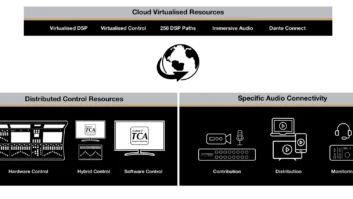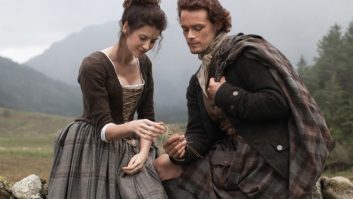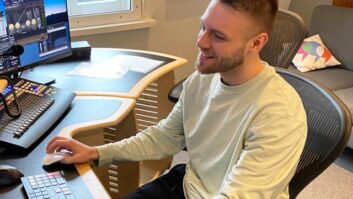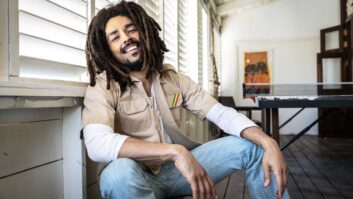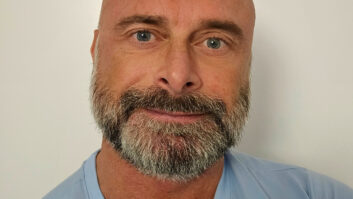To mark International Women in Engineering Day on 23rd June, TVBEurope spoke to Alice Sarre, junior engineer at BBC Studioworks and her colleague Caroline Mayne, supervisory engineer.
The pair discuss how they got started in the TV industry, the best part of their jobs, and who are their engineering heroes.
What made you want to work in the technology side of the TV industry?
Alice Sarre: I went to university to study Film and Television Production. I wasn’t sure exactly which aspect of television I wanted to work in, but I’d always enjoyed problem solving and working with computers. The course I did was a BSc so there was a lot of technical study, and I discovered that was the side of production I enjoyed the most. I loved helping other people with their issues and figuring out how all the kit worked. When I finished university, I started applying for the more technical-based jobs in the industry, and I was lucky enough to get a job as a trainee broadcast engineer where I worked for two years. From there I joined BBC Studioworks.
Caroline Mayne: I didn’t plan on becoming an engineer… I wanted to be an astronaut!
I was raised by my dad from an early age, as an only-child. Dad introduced me to electronics and helped me build a Crystal Radio. I was fascinated that this small pile of odd components made it possible for me to listen to radio stations from all over.
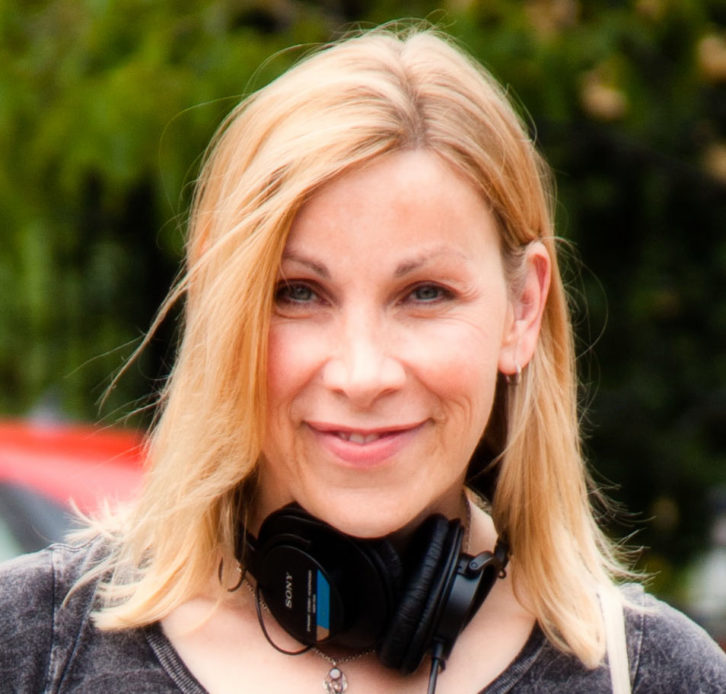
In school, I excelled in science classes and had a huge head-start over my classmates – I credit my dad for inspiring me. We would look at the stars together and we’d have our dad/daughter time watching TV shows like Star Trek and Doctor Who. During the last few Apollo Missions, I have memories of my dad rushing outside with me to try and catch a glimpse of a Saturn V Rocket! Following Apollo, the Space Shuttle Project began, and I was hooked.
I’ve always had a passion for sound and music. I brought drums home as a teenager, expecting to be told to take them back. Instead, my dad indulged me and said I could keep them if I had lessons. A few years later I approached a recording studio nearby and naively asked to play drums for them. The owner spoke with my dad and this led to me learning to become a sound engineer. I played drums and keyboards too and was in the right place at the right time, as Sequencers and soon after MIDI, became a thing. As a drummer who could read music, I was able to create and programme drum sequences and with my fascination with technology, I found that I could trouble-shoot problems with these newfangled devices when they failed. I went on to record with many well-known musical acts of the time as a sound engineer and in some cases, additionally as writer/producer/musician.
How welcoming have you found the industry?
AS: Everyone has been so lovely. It’s hard being a young woman in a lot of industries, and engineering definitely has its fair share of challenges, but it helps when the people are so easy to get along and chat with. Everyone is also very willing to share their knowledge and experiences, which is so important in engineering where a lot of what you do is based on local setups.
CM: From personal experience of the industry, it seems I’ve had to try harder than some of my male peers to be taken seriously and to be thought of as a capable engineer. I’m happy to say, wherever I have worked and where people have gotten to know me and how I work, my experiences have been largely positive.
Tell us about your role at BBC Studioworks, and what that involves
AS: I’m a junior engineer. There are three of us and we’re currently on rotation between three different engineering areas; post production, new business and entertainment and drama services. We all spend six months in each place, shadowing the engineers and learning as much as we can. It’s a training process, so after a year and a half, we could comfortably work with any of the three teams. I help out with fixing the equipment, rigging and derigging for different shows and general maintenance duties. I do jobs on my own if I feel comfortable, but most of the time I’m learning from the other engineers.
CM: As a supervisory studio engineer at BBC Studioworks, my job is about trouble-shooting and problem solving. It involves trying to find the best way (often creatively) to join all the techy bits together such that production can make the show they’ve envisioned. Each show is a new challenge and might need 20 cameras, three in-vision-monitors which need colour-correcting and are switchable from the vision mixer and so on. There may be many stations that require specific audio and video monitoring of cameras, VTs and other sources. It can be challenging but rewarding when it works!
What’s the best part of your job?
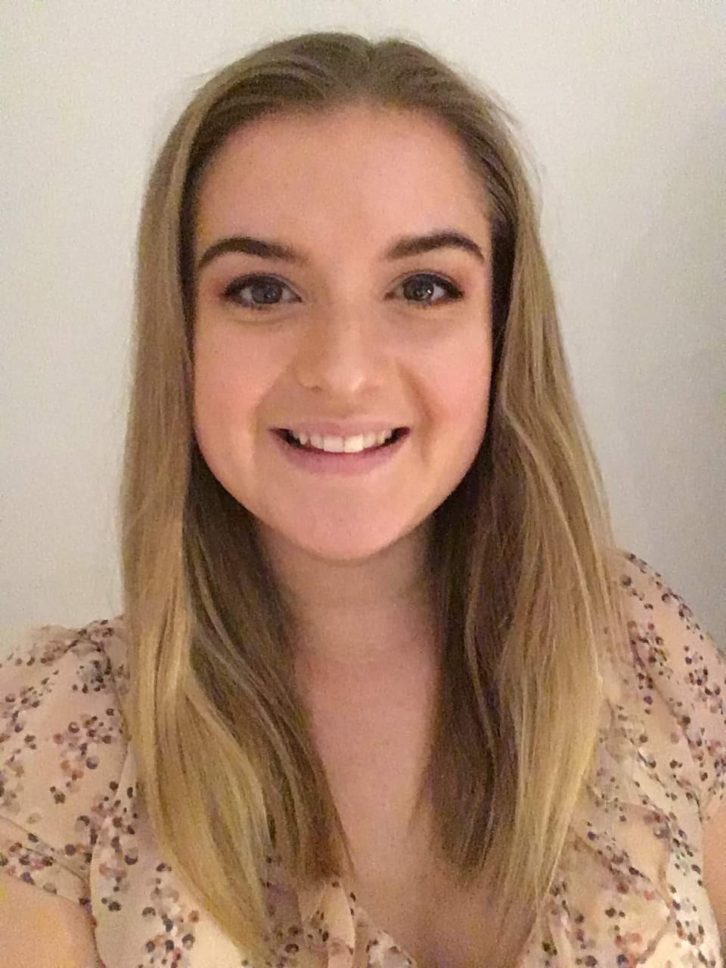
AS: The best part of my job is the moment when I’m fixing something, or building something, and it starts working. It’s really great, as well, to be able to help people with their problems. When you’re in a live environment where people are stressed, and you know that you are in the position to be able to help those people, even if it’s just a little bit, that’s wonderful.
CM: The best part of my job is the feeling that my efforts, combined with those of everyone else in the production, all uniquely play their part in making a TV show. It’s a team effort and when you work on a show for any period of time, you gain the mutual respect and trust of those around you. It feels good to be a vital cog in a precision timepiece, that would not function if it or any of the many cogs were missing!
What’s the worst?
AS: It is still hard to be a woman in this industry, especially a young woman. Sometimes you need to take a step back and just remind yourself that you have as much right to be there as anyone else. That is changing though; it gets easier all the time and will only continue to get easier as the industry becomes more diverse. Waiting for change is frustrating, but I know we can get there.
CM: The worst part of the job is probably the shifts. Television is a very dynamic environment and doesn’t conform to “regular” Monday to Friday, 9-5, business hours. Shifts can often be very long.
Would you recommend a job in the TV industry to someone else?
AS: I definitely would. It’s hard work and the hours can be quite random, but it’s very rewarding. You get to be a part of some amazing shows and it’s exciting to be able to say that you work on them. If you enjoy problem solving and working with a great team of people then you’d certainly enjoy it.
CM: The industry has come a long way since I started, surrounded mostly by men. It was scary and I had self-doubts and felt like I was seen as some kind of novelty. Today I was sent a crew picture from The Goes Wrong Show, for which I was the credited supervisory engineer. In that picture there are 25 women, all of whom had key roles in sound, cameras, vision, engineering and other areas. I’m proud to be among these women, showing future generations that all roles within the TV industry in this day and age are truly non-gender specific. Would I recommend a job in the TV industry? Abso-fraking-lutely!
The theme of this year’s International Women in Engineering Day is ‘engineering heroes’. Who are your engineering heroes?
AS: An engineer who fascinates me is Hedy Lamarr. She was a female engineer who was also a famous actor. She had great success as an actor, but during World War II dedicated herself to engineering and inventing. She was typecast in most of her films because of her beauty and was constantly frustrated that she couldn’t be respected as both an actor and an engineer. I think her struggle is still very real today and I respect her a great deal for pursuing what she wanted, despite society constantly telling her she either shouldn’t, or couldn’t.
CM: Who is my engineering her-o? Before I answer I should say that I only recently discovered that D.C Fontana, one of the primary writers of classic Star Trek, was in fact Dorothy Fontana, a WOMAN!!! This revelation at once made me feel better about being female and enjoying Star Trek as a kid, something I would shamefully hide from the popular girls in school!
However, the person I most admire and feel a connection with is Delia Derbyshire. I was fascinated and mesmerised by the Doctor Who theme, credited to Ron Grainer. As a teenager I learned about the BBC Radiophonic Workshop and the significant contribution Delia Derbyshire made to realising that iconic theme and much, much, more. Delia was a pioneering musician and composer. She was able to create music by “sampling” common objects (her favourite said to be a metal lamp shade) and precisely tuning and looping the sounds to create what we would now call electronic music.
In the 1960s Delia was a trailblazer for women, in technical/engineering roles. She wasn’t put off by being one of only a few women in a male dominated part of the industry. As a woman having worked for many years in male-dominated “techy” roles, from my experiences, I can imagine how hard it was for her in the ’60s to push aside her self-doubts and fears and ignore the likely comments and pre-conceived notions some may have had about her abilities.
I identify with Delia as a strong, yet feminine woman, equally technical and creative. I would go so far as to say she is the mother of modern music creation techniques! We use many of the methods she helped to pioneer in the ’60s at Maida Vale, with the same terminology, except now we do it all inside computers!
